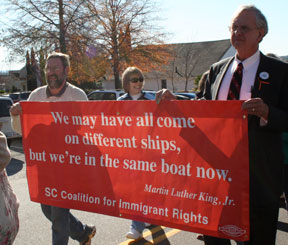
 COLUMBIA—Words of prayer, moving testimony, gospel music and the civil rights anthem “We Shall Overcome” rose from the steps of the Statehouse Dec. 18 as hundreds prayed for the overturn of a controversial new state immigration law.
COLUMBIA—Words of prayer, moving testimony, gospel music and the civil rights anthem “We Shall Overcome” rose from the steps of the Statehouse Dec. 18 as hundreds prayed for the overturn of a controversial new state immigration law.
More than 300 people from a variety of Christian denominations and other faiths attended a prayer vigil organized by the South Carolina Christian Action Council, the South Carolina Progressive Network and others who oppose the law, known as S.B. 20.
Similar vigils went on in Greenville, Hilton Head, and other cities in advance of a Dec. 19 hearing before U.S. District Judge Richard Gergel in Charleston. The federal government has asked him to stop the law from going into effect Jan. 1.
The U.S. Department of Justice and other plaintiffs filed suit against South Carolina in October, saying that parts of the new law are unconstitutional and only the federal government can enforce immigration law.
Bishop Robert E. Guglielmone participated in a prayer vigil about the immigration law on Dec. 19 in Charleston shortly before deliberations began at the federal courthouse.
The vigil was sponsored by the Lutheran, Anglican, Roman Catholic and United Methodist Bishops’ Dialogue (LARCUM). Also in attendance were Bishop Herman Yoos of the South Carolina Synod of the Evangelical Lutheran Church in America, Bishop Andrew Waldo of the Episcopal Diocese of Upper South Carolina, and Bishop Virginia Taylor of the South Carolina United Methodist Conference. Bishop Mark Lawrence of the Episcopal Diocese of South Carolina was unable to attend.
The LARCUM bishops agreed during recent meetings to focus on compassionate reform of immigration laws.
Many speakers at the Columbia vigil talked about fears that the new law would cause racial profi ling, create suspicion among neighbors, and threaten to tear apart families.
Father Sandy McDonald, pastor of St. John Neumann Church in Columbia, said the proposed law ignored the “far more complex reality” of immigration such as the poverty that forces many to leave their home countries and seek work in the United States.
“Remember Jesus broke some rules in his day,” Father McDonald said. “He would cure people on the Sabbath, which was illegal, against the law of the day. The good of the people always came first for Jesus. There has to be a better way to address this issue humanely. Help us to put on the mind of Jesus and give us eyes to see all people as brothers and sisters.”
The vigil also featured Episcopalian, Evangelical Lutheran, United Methodist, and African Methodist Episcopal speakers, plus people of other faiths.
Rabbi Leah Doberne-Schor, Hillel advisor for the University of South Carolina, used the story of Ruth and Naomi from the Old Testament as an example of how travelers and migrants could be welcomed compassionately and accepted into a community.
The crowd was diverse in age and background, with a large Hispanic turnout.
Seira Reyes of Gilbert attends St. John of the Cross Church, a predominantly Hispanic parish in Batesburg-Leesville. She said the proposed new law makes many people at the church afraid.
“So many people don’t believe S.B. 20 will benefit the people of South Carolina,” she said. “I’m here to support my friends and fellow parishioners. I don’t want them to lose hope and faith.”
Rizalino Mandanas of Columbia stood alongside his daughter Joy Mandanas, an immigration attorney in the city. Both are members of St. John Neumann Church, and said they came to show support for immigrants because it was the right thing to do.
“Jesus would have been here today if He was on earth right now,” Ms. Mandanas said.
